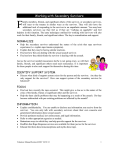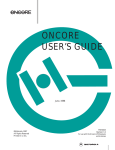Download File
Transcript
Chapter 3: Parents Review Notes Section 1: The Relationship Bank Account The Relationship Bank Account, also known as “RBA”, represents the amount of trust you have in a relationship. You build a relationship one deposit at a time. Here are 6 deposits that seem to work well with parents. Deposits are the nice things you do and say for your parents. Withdrawals are the negative things you do and say to your parents. Number 1 2 3 4 5 6 Deposits Understand what’s important to them Tell the truth Sense the need and do it Remember the little things Open up Use the most important words - Withdrawals Assume you know - Lie and cover up Wait until you’re told Don’t do the little things Close yourself off Avoid the most important words Deposit #1 Understand What’s Important To Them Never assume that a deposit for you is also a deposit for your parents. Deposit #2 Tell the Truth Nothing destroys trust faster with your parents than LYING. It’s the BIGGEST withdrawal Deposit #3 Sense the Need And Do It Do the dishes need to be done? Does your little sister need a ride home? Does your mom need a break? If so, don’t wait to be asked—sense the need and do it. Deposit #4 Remember The Little Things When it comes to relationships, the little things are the big things. The little things are a kind word, a warm smile, a thank you note. Deposit #5 Open Up Sometimes you just don’t feel like talking, especially if it feels like an interrogation. Fact is, you’ll never get close to your parents unless you share what’s going on in that head of yours. Deposit #6 Use The Most Important Words When it comes to getting along with your parents… - The single most important word is please. - The two most important words are thank you. - The three most important words are I love you. - And the four most important words are how can I help? Chapter 3: Parents Review Notes Section 2: You’re So Annoying As we all know, parents can be annoying. Specifically, these are 5 of the top complaints: Complaint #1 My parents are always comparing me If you’re being compared, consider this… - First, try not to take it too personally. Just remember how it feels and make a resolution not to do it to your kids. - Second, you may want to make them aware of how you feel. Complaint #2 My Parents Are Never Satisfied Your parents constantly rag on you. You can’t seem to do anything right. If this is how you feel, don’t start thinking that your parents don’t love you. Like the comparing thing, they often don’t realize what they’re doing and do mean well. Maybe this is the way they were raised. When you become a parent, it’s not like you get a user’s manual on how to be an awesome parent. One thing you can try is to point out all of the good stuff you are doing. Complaint #3 My Parents Are Embarrassing Maybe your mom and dad are out of touch when it comes to fashion and music. So what! They’re usually very much in touch when it comes to the important things, like how to bounce back after you just got dumped. In case you hadn’t noticed, they have quite a bit more experience than you do. Use this equation: My dad’s age + my mom’s age= my parents combined age My parents combined age = my parents years of experience > mine Complaint #4 My Parents Are Overprotective If you think your parents are overprotective you might draw two different conclusions. One, they don’t trust you or two, they care about you a bunch. In most cases, so called overprotective parents simply care a lot and show it through lots of rules and wanting to know everything. Don’t get too hung up on parental rules. After all, if you had to choose, don’t you think you’d rather have parents that seem to care too much than parents who don’t seem to care at all? If you’re fully worth of your parents trust and you think they’re still ridiculously strict, what can you do? Unfortunately I don’t have a good answer except to say: remain worthy of their trust. Keep telling the truth. And be careful not to become so preoccupied with their strictness that it makes you want to rebel. 3 Techniques To Help Negotiate With Parents 1. I’ll Scratch Your Back If You Scratch Mine Sometimes parents will bend the rules a little if you do something big for them. 2. The Reservoir Show that you are responsible by obeying your curfew with exactness for a period and building a reservoir of trust. 3. The Big Event If you have something big coming up, let your parents know well in advance. Often they’ll be willing to make exceptions. Complaint #5 My Parents Are Always Fighting In such situations, the only thing you can control is YOU. You can’t change your parents, but you can choose not to tell, scream, and fight back. You can be pleasant. You can be a peacemaker. And that’s a start. Dealing with Divorce: All that fighting sometimes leads to divorce. Here are 4 pieces of advice on what teens can do to make divorce easier: 1. Be Fair: Most teens say it’s important that parents don’t try to get them to take sides. 2. Keep In Touch: even if someone moves, it’s a good idea to stay in touch through e-mails or phone calls just to say “I’m thinking about you”…it can ease the feelings of missing each other. 3. Live Your Life: Parents sometimes get so caught up in their own changes and it can feel like your life is on hold. When things are changing at home, it can really help to keep some things, such as school, activities and friends the same. Take care of yourself too, by eating right and exercising—2 great stress busters. 4. Let Others Support You: If you’re feeling down or upset let your friends and family members support you. These feelings usually pass but if they don’t and you’re feeling depressed or stressed out, or it’s hard to concentrate on your normal activities, let a counselor or therapist help you. Your parents, teachers, school counselor or doctor can help you find someone to talk to. Chapter 3: Parents Review Notes Section 3: Closing The Gap Do you ever feel like you and your parents speak different languages? Well, you do. Sort of. You see, while you worry about what your friends are going to say about your new haircut, they worry about how they’re going to pay the bills. You and your parents see life through a different pair of glasses. You say one thing and your parents hear something else or vice versa. There are always two sides to the story—this is called a communication gap. Getting To Know You One of the best ways to overcome the communication gap is to get to know each other better. All It Takes Is One Do you ever feel that you have the same conversation again and again with your mom or dad? Or that you can predict the outcome of almost every conversation? If you and your parents have a communication gap, even one the size of the Grand Canyon, have hope. You can change the outcome of almost every conversation if just ONE of you is willing to take a different approach. If your parents won’t change, you can. You can start to communicate in a better and smarter way. 3 Time-Tested Skills That Are Foundational To All Good Communication Skill #1: Think WinWin If you care about what your parents want, you’ll get a lot more of what you want. Always thing about what the win is not only for you, but also for your parents. Skill #2: Seek First To This means to listen first, then talk. Our tendency is to talk first, then pretend Understand, Then To listen. Take the time to really understand your parents’ point of view before Be Understood opening your mouth. Repeat what they’re saying and feeling in your own words. Listening involves more than just your EARS; it also requires your EYES & HEART. Skill #3: Synergize Talk through your differences. Try to see their point of view first. Then share your point of view. Finally, explore all your options and pick the best one. Disarming Your Parents In One Line Or Less Often your parents say things that really push your buttons, like, “Because I said so. That’s why!” or “You’ll do what I say or else…” In a sense, they have picked up their sword and publicly challenged you to a duel. The worst thing you can do is pick up your own sword and engage in battle. You will never win one of these. Instead, disarm them by doing one of three things: 1. Apologize 2. Bite your tongue and say nothing 3. Seek first to understand by repeating in your own words what they are saying and feeling Note: By not picking up your own sword, it will cause them to drop theirs. And it usually only takes one line to disarm them. Just watch. Two Classic Blunders There are two classic blunders teens often make that tick off parents and destroy trust. Avoid them. They’re not worth it. You may feel good for the moment, but you’ll pay for it later. Blunder #1: The Last Word Blunder #2: I Hate You After the conversation has wrapped to a natural conclusion, resist the urge to take one last jab at your parents. You’ll just open up a whole new can of worms. Choose your battles wisely. I hate you is just a convenient phrase we hurl at our parents when we’re mad or frustrated and nothing else comes to mind. How To Break Bad News To Your Parents Chapter 3: Parents Review Notes Section 4: When You Have To Raise Your Parents Most parents are doing the best they can. Despite all their shortcomings, they love you and want the best for you. But some teens aren’t so lucky and have parents with major problems such as: - Totally absent from your life - Addicted to drugs or alcohol - Sleep around with every passing stranger - Abusive with their words and fists They may still love you, but they’ve lost control of their lives. Their addictions and habits are stronger than their love. Some things to consider… Get Help If your parents are hooked on drugs or alcohol, they obviously need help, such as seeing a therapist or going through a rehab program. One of the signs of addiction is denial so they usually won’t admit then have a problem. Consider talking to a grandmother or grandfather, an aunt or uncle, or an adult friend. Or talk with a school counselor or trusted teacher. If you’re in a home where you are beaten or sexually molested, you must get help immediately. No one deserves to live under those conditions. Contact someone you can trust or call the police directly. Love and Forgiveness If your parents are totally dysfunctional, you don’t want to follow in their footsteps, but you can still love them, and, however hard it may be, forgive them. Breaking the Cycle Life’s not fair. How is it that one kid grows up in a home where they are loved and made to feel like they are somebody and another kid grows up in a home where they are abused and made to feel worthless? If you’re the latter, you may ask: “What did I do to deserve this?” Well, you didn’t do anything to deserve it. It’s not right, and it’s not your fault. You can do something about it. How? By breaking the cycle. If your parents are messed up and their parents were messed up, you can break the cycle by not repeating those negative patterns in your own life, and by passing on good habits to your own kids someday. Your #1 Influence There are a lot of myths about teens. One of the big ones is that teens don’t like their parents. Not true. Most teens like their parents, wan to get along, and wish they could spend more time with them. In fact, you rank parents as the #1 influence in your lives, above friends, media, faith, heroes, or whatever else. There are so many fun things you can do with your parents. You can shoot hoops, go to a ball game, attend a concert, camp, hike, fish, go out to eat, bake cookies, watch the stars, go on Sunday drives, watch your favorite reality show, or listen to music. Even if you have only one thing in common, take advantage of it. Final Notes You’ve probably figured out by now that you can’t choose your parents. Sorry, but you’re stuck with them. That’s why what you choose to do about that feeling which exists between you and them is one of the 6 big decisions. So what’s it going to be? Are you going to take the high road or the low road? High Road Build good relationships Work through problems Show love and respect Low Road Give up on relationships/run away from problems Fight or sulk about problems Show no respect I think you’re better off taking the high road, however hard it may seem at times. If your relationship is nonexistent, start making deposits today, not matter how small. Never give up on your parents, just like you hope they never give up on you!


















